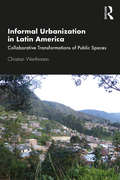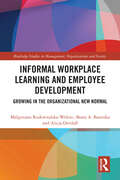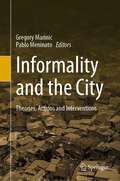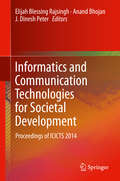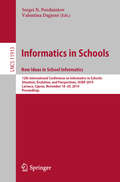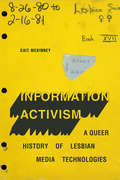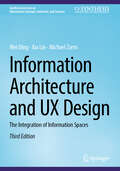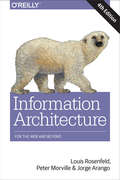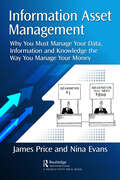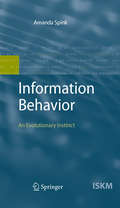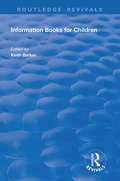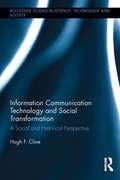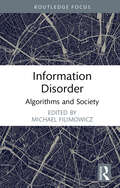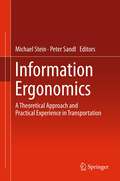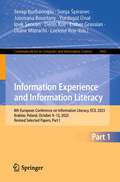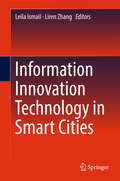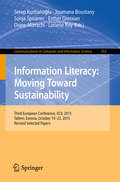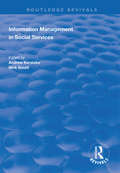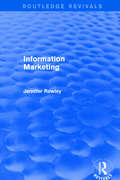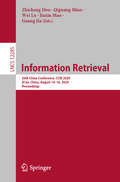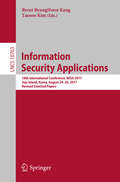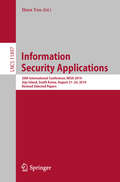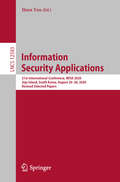- Table View
- List View
Informal Urbanization in Latin America: Collaborative Transformations of Public Spaces
by Christian WerthmannVarious kinds of informal and extra-legal settlements—commonly called shantytowns, favelas, or barrios—are the prevailing type of urban land use in much of the developing world. United Nations estimates suggest that there are close to 900 million people living in squatter communities worldwide, with the number expected to increase in the coming decades. Informal Urbanization in Latin America investigates prevailing strategies for addressing informal settlements, which started to shift away from large-scale slum clearance to on-site upgrading in Latin America over the last 40 years, by improving public spaces, infrastructure and facilities. The cases in this book range from one micro intervention (the Villa Tranquila Project in Buenos Aires) to three large-scale government-run projects: the celebrated Favela Bairro Program in Rio de Janeiro, the social housing program in São Paulo and the famous Proyectos Urbanos Integrales Approach in Medellín. The cases show a collaborative and sensitive transformation of landscape and public space, and provide designers and planners with the tools to develop better strategies that can mitigate the volatility that the residents of non-formal neighborhoods are exposed to. The book is a must-read for all who are interested or working in the global urbanization as well as social equity.
Informal Workers and Organized Action: Narratives From the Global South
by Neetu ChoudharyThis book utilizes the School to Work Transition Survey (SWTS) of the ILO to discuss what shapes an individual worker’s decision to participate in unionization and how her working condition is affected by that.. There remains a disconnect as far as our understanding of the relationship between the labour’s choice to unionize as individual actor and the broader socioeconomic, political and cultural context of that choice, is concerned.Using the SWTS data, the book focuses on the identification of the correlates of workers’ propensity to unionize, the outcomes of unionizing and their synthesis with the wider political economy context to arrive at stylized patterns in the way informal workers exercise their agency.The book also reflects upon field data on organizing challenges of migrant workers in the light of the COVID-19 pandemic in India. The book does not claim to establish any causality but is interested in bringing out broad patterns that define informal workers’ organizing in a particular context. In the process, the book ends up with the preposition that despite all the heterogeneities across regions, informal workers’ organizing today can be understood through the lens of pragmatism.
Informal Workplace Learning and Employee Development: Growing in the Organizational New Normal (Routledge Studies in Management, Organizations and Society)
by Malgorzata Rozkwitalska-Welenc Beata A. Basinska Alicja DettlaffThe new paradigm in employee development assumes that employees should proactively direct their learning and growth. Most workplace learning is basically informal and occurs through daily work routines, peer-to-peer interactions, networking, and typically brings about significant positive outcomes to both individuals and organizations. Yet, workplace learning always occurs in a pre-defined context and this context has recently changed, and hereafter many people have been delegated to work from home or any other remote locations. Many employees would like to maintain remote or hybrid work design in the future, as well. In this research monograph, the authors explore an unexplored topic in social science research concerning proactive employee development through informal learning in new ways of working (NWW). The authors are esteemed experts in organizational studies, organizational psychology, and human resource management. The monograph will be of interest to students and researchers in organizational studies, organizational behavior, organizational psychology and organizational learning, as well as human resource professionals concerned with employee development and the changing nature of work.
Informality and the City: Theories, Actions and Interventions
by Gregory Marinic Pablo MeninatoThis book advances the agenda of informality as a transnational phenomenon, recognizing that contemporary urban and regional challenges need to be addressed at both local and global levels. This project may be considered a call for action. Its urgency derives from the impact of the pandemic combined with the effects of climate change in informal settlements around the world. While the notion of “the informal” is usually associated with the analysis and interventions in informal settlements, this book expands the concept of informality to acknowledge its interdisciplinary parameters.The book is geographically organized into five sections. The first part provides a conceptual overview of the notion of “the informal,” serving as an introduction and reflection on the subject. The following sections are dedicated to the principal regions of the Global South—Latin America, US–Mexico Borderlands, Asia, and Africa—while considering the interconnections and correspondences between urbanism in the Global South and the Global North.This book offers a critical introduction to groundbreaking theories and design practices of informality in the built environment. It provides essential reading for scholars, professionals, and students in urban studies, architecture, city planning, urban geography, sociology, anthropology, cultural studies, economics, and the arts. As a critical survey of informality, the book examines history, theory, and production across a range of informal practices and phenomena in urbanism, architecture, activism, and participatory design. Authored by a diverse and international cohort of leading educators, theorists, and practitioners, 45 chapters refine and expand the discourse surrounding informal cities.
Informality: Social Theory and Contemporary Practice (International Library of Sociology)
by Barbara MisztalFor most of the twentieth century, modernity has been characterised by the formalisation of social relations as face to face interactions are replaced by impersonal bureaucracy and finance. As we enter the new millennium, however, it becomes increasingly clear that it is only by stepping outside these formal structures that trust and co-operation can be created and social change achieved. In a brilliant theoretical tour de force, illustrated with sustained case studies of changing societies in the former eastern Europe and of changing forms of interaction within so-called virtual communities, Barbara Misztal, argues that only the society that achieves an appropriate balance between the informality and formality of interaction will find itself in a position to move forward to further democratisation and an improved quality of life.
Informatics and Communication Technologies for Societal Development
by Elijah Blessing Rajsingh Anand Bhojan J. Dinesh PeterThis volume comprises research papers presented at the International Conference on Informatics and Communication Technologies for Societal Development (ICICTS 2014) held at Karunya University, India. The content focuses on the recent advancements in image or signal processing, computer vision, communication technologies, soft computing, advanced computing, data mining and knowledge discovery. The primary objective of this volume is to facilitate advancement and application of the knowledge and to promote ideas that solve problems faced by society through cutting-edge technologies. The chapters contain selected articles from academicians, researchers and industry experts in the form of frameworks, models and architectures. Practical approaches, observations and results of research that promotes societal development are also incorporated. This volume will serve as a useful compendium for interested readers and researchers working towards societal development from the technological perspective.
Informatics in Schools. New Ideas in School Informatics: 12th International Conference on Informatics in Schools: Situation, Evolution, and Perspectives, ISSEP 2019, Larnaca, Cyprus, November 18–20, 2019, Proceedings (Lecture Notes in Computer Science #11913)
by Valentina Dagienė Sergei N. PozdniakovThis book constitutes the proceedings of the 12th International Conference on Informatics in Schools: Situation, Evolution and Perspectives, ISSEP 2019, held in Larnaca, Cyprus, in November 2019. The 23 revised full papers presented were carefully reviewed and selected from 55 submissions. They are organized in topical sections named : teacher education in informatics, primary education in informatics, contemporary computer science ideas in school informatics, teaching informatics: from highschool to university levels, contests, competitions and games in informatics.
Information Activism: A Queer History of Lesbian Media Technologies (Sign, Storage, Transmission)
by Cait McKinneyFor decades, lesbian feminists across the United States and Canada have created information to build movements and survive in a world that doesn't want them. In Information Activism Cait McKinney traces how these women developed communication networks, databases, and digital archives that formed the foundation for their work. Often learning on the fly and using everything from index cards to computers, these activists brought people and their visions of justice together to organize, store, and provide access to information. Focusing on the transition from paper to digital-based archival techniques from the 1970s to the present, McKinney shows how media technologies animate the collective and unspectacular labor that sustains social movements, including their antiracist and trans-inclusive endeavors. By bringing sexuality studies to bear on media history, McKinney demonstrates how groups with precarious access to control over information create their own innovative and resourceful techniques for generating and sharing knowledge.
Information Architecture and UX Design: The Integration of Information Spaces (Synthesis Lectures on Information Concepts, Retrieval, and Services)
by Xia Lin Wei Ding Michael ZarroThis book explores integrated information spaces in the web context and beyond, with a focus on putting theories and principles into practice. The authors illustrate the heightened significance of Information Architecture (IA) and User Experience (UX) in industry and society. Building on foundational perspectives, the book explores advanced topics such as user research, the evolving role of Artificial Intelligence (AI), human information behaviors, and systems thinking. This Third Edition adopts a forward-looking approach to integrated web, social media, business tools, and more. Additionally, the book covers advancements in information technologies since the last release, including Generative AI and evolving IA/UX practices.
Information Architecture: For the Web and Beyond
by Peter Morville Louis Rosenfeld Jorge ArangoInformation architecture (IA) is far more challenging—and necessary—than ever. With the glut of information available today, anything your organization wants to share should be easy to find, navigate, and understand. But the experience you provide has to be familiar and coherent across multiple interaction channels, from the Web to smartphones, smartwatches, and beyond.To guide you through this broad ecosystem, this popular guide—now in its fourth edition—provides essential concepts, methods, and techniques for digital design that have withstood the test of time. UX designers, product managers, developers, and anyone involved in digital design will learn how to create semantic structures that will help people engage with your message.This book includes:An overview of IA and the problems it solves for creating effective digital products and servicesA deep dive into IA components, including organization, labeling, navigation, search, and metadataProcesses and methods that take you from research to strategy, design, and IA implementation
Information Asset Management: Why You Must Manage Your Data, Information and Knowledge the Way You Manage Your Money
by Nina Evans James PriceOrganisations are using data, information and knowledge as a competitive weapon. Their data, information and knowledge are arguably their most valuable assets. Yet, this fourth asset is managed badly when compared to the other three assets, namely money, people and infrastructure with considerable risk to the organisation. Executives are accountable for the success of their organisations, and those who don’t manage this critical resource and business enabler effectively can be regarded as negligent. Information Assets carry enormous risk and value. Most boards and executives don’t know how to govern and manage IAs effectively and nobody is held accountable. Given this, organisations should govern and manage their Information Assets the way they manage their Financial Assets. The benefits of managing IAs well are compelling. These benefits include increased efficiency, productivity, employee satisfaction, improved decision-making, mitigating business risk and improving product, protecting corporate reputation and service delivery. Drawing on ground-breaking research, this book explains why Information Assets are so important to organisations and the barriers to managing them well. This book is unique in the sense that it takes a fresh look at this topic, is based on experience and research, and includes interviews from more than 70 industry leaders. In short, this book is written by executives and explains where to start.
Information Behavior
by Amanda SpinkInformation behavior has emerged as an important aspect of human life, however our knowledge and understanding of it is incomplete and underdeveloped scientifically. Research on the topic is largely contemporary in focus and has generally not incorporated results from other disciplines. In this monograph Spink provides a new understanding of information behavior by incorporating related findings, theories and models from social sciences, psychology and cognition. In her presentation, she argues that information behavior is an important instinctive sociocognitive ability that can only be fully understood with a highly interdisciplinary approach. The leitmotivs of her examination are three important research questions: First, what is the evolutionary, biological and developmental nature of information behavior? Second, what is the role of instinct versus environment in shaping information behavior? And, third, how have information behavior capabilities evolved and developed over time? Written for researchers in information science as well as social and cognitive sciences, Spink's controversial text lays the foundation for a new interdisciplinary theoretical perspective on information behavior that will not only provide a more holistic framework for this field but will also impact those sciences, and thus also open up many new research directions.
Information Books for Children (Routledge Revivals)
by Keith BarkerFirst published in 1992, this book will be an invaluable help to librarians, teachers and parents looking for quality information books for children. Four Hundred and Seventy titles have been selected by an experienced team of reviewers for young people between the ages 3 and 16. Written by teachers and librarians, each review includes full bibliographical details, a succinct assessment of the book and an indication of reader age range. The subjects covered take into account the requirements of the National Curriculum. All areas of knowledge are covered, but no attempt was made to find recommended titles in all subjects – the quality of the book with a specific topic, author or title in mind, detailed subject and author/title indexes are supplied.
Information Communication Technology and Social Transformation: A Social and Historical Perspective (Routledge Studies in Science, Technology and Society #25)
by Hugh F. ClineThis book argues that information communication technologies are not creating new forms of social structure, but rather altering long-standing institutions and amplifying existing trends of social change that have their origins in ancient times. Using a comparative historical perspective, it analyzes the applications of information communication technologies in relation to changes in norms and values, education institutions, the socialization of children, new forms of deviant and criminal behaviors, enhanced participation in religious activities, patterns of knowledge creation and use, the expansion of consumerism, and changing experiences of distance and time.
Information Disorder: Algorithms and Society (Algorithms and Society)
by Michael FilimowiczThis book focuses on the recent rise of “infodemics” as forms of disinformation, misinformation and mal-information saturate contemporary media platforms, shaping public opinion to advance agendas. The internet in general and social media in particular have relativized, through their global, complex and instantaneous information flows, assumptions about truth and authority in fact-based content. This has created new opportunities for state actors to use information beyond traditional conceptions of propaganda to directly assault a public’s conception of reality. Additionally, almost anyone has the capability to challenge evidential claims through narratives and imagery alone as there is a wide appetite online for alternative realities. This requires new approaches to media literacy in education, the creative arts and our acts of media consumption and dissemination. The volume covers the ways that social media platforms amplify and catalyze the messages of politicians and influencers, the ambivalence of algorithms that can both generate and detect problematic information, how fake news imitates the style of memes to gain widespread social traction and virality, and how artists have intentionally created “sicko AIs” in new media performances to highlight the ethical risks of increasingly “intelligent” technologies. Scholars and students from many backgrounds, as well as policy makers, journalists and the general reading public, will find a multidisciplinary approach to questions posed by information disorder research from the fields of communication, social psychology, human-computer interaction, journalism, media, semiotics and new media art.
Information Ergonomics: A theoretical approach and practical experience in transportation
by Michael Stein Peter SandlThe variety and increasing availability of hypermedia information systems, which are used in stationary applications like operators' consoles as well as mobile systems, e.g. driver information and navigation systems in automobiles form a foundation for the mediatization of the society. From the human engineering point of view this development and the ensuing increased importance of information systems for economic and private needs require careful deliberation of the derivation and application of ergonomics methods particularly in the field of information systems. This book consists of two closely intertwined parts. The first, theoretical part defines the concept of an information system, followed by an explanation of action regulation as well as cognitive theories to describe man information system interaction. A comprehensive description of information ergonomics concludes the theoretical approach. In the second, practically oriented part of this book authors from industry as well as from academic institutes illustrate the variety of current information systems taken from different fields of transportation, i.e. aviation, automotive, and railroad. The reader thus gains an overview of various applications and their context of use as well as similarities and differences in design. This does not only include a description of the different information systems but also places them in the context of the theories and models, which were presented in the first part of this book.
Information Experience and Information Literacy: 8th European Conference on Information Literacy, ECIL 2023, Kraków, Poland, October 9–12, 2023, Revised Selected Papers, Part I (Communications in Computer and Information Science #2042)
by Serap Kurbanoğlu Joumana Boustany Sonja Špiranec Esther Grassian Diane Mizrachi Loriene Roy Yurdagül Ünal Denis Kos İpek ŞencanThe two-volume set CCIS 2042 and 2043 constitutes the refereed proceedings of the 8th European Conference on Information Literacy, ECIL 2023, held in Kraków, Poland, in October 2023.The 47 full papers presented in these proceedings were carefully reviewed and selected from 182 submissions. The papers have been organized in the following topical sections: algorithms, artificial intelligence and information literacy; data literacy and digital literacy; information experience and information behaviour; policy, strategies, frameworks, research and different approaches; credibility, ethics, challenges and new paths; and information literacy instruction and education.
Information Innovation Technology in Smart Cities
by Leila Ismail Liren ZhangThis book describes Smart Cities and the information technologies that will provide better living conditions in the cities of tomorrow. It brings together research findings from 27 countries across the globe, from academia, industry and government. It addresses a number of crucial topics in state of the arts of technologies and solutions related to smart cities, including big data and cloud computing, collaborative platforms, communication infrastructures, smart health, sustainable development and energy management. Information Innovation Technology in Smart Cities is essential reading for researchers working on intelligence and information communication systems, big data, Internet of Things, Cyber Security, and cyber-physical energy systems. It will be also invaluable resource for advanced students exploring these areas.
Information Literacy: Third European Conference, ECIL 2015, Tallinn, Estonia, October 19-22, 2015, Revised Selected Papers (Communications in Computer and Information Science #552)
by Serap Kurbanoğlu Joumana Boustany Sonja Špiranec Esther Grassian Diane Mizrachi Loriene RoyThis book constitutes the refereed proceedings of the Third European Conference on Information Literacy, ECIL 2015, held in Tallinn, Estonia, in October 2015. The 61 revised full papers presented were carefully reviewed and selected from 226 submissions. The papers are organized in topical sections on information literacy, environment and sustainability; workplace information literacy and knowledge management; ICT competences and digital literacy; copyright literacy; other literacies; information literacy instruction; teaching and learning information literacy; information literacy, games and gamification; information need, information behavior and use; reading preference: print vs electronic; information literacy in higher education; scholarly competencies; information literacy, libraries and librarians; information literacy in different context.
Information Management in Social Services: Volume 2: Information Management In Social Services (Routledge Revivals)
by Nick Gould Andrew KerslakeFirst published in 1996, this volume explores the role of IT in the social services sector and provides solutions to problems of information flow and management, with contributors and researchers experienced in statistics, planning and policy for social services. Its publication marked a rite of passage for social services informatics. Articles contained in this volume confront the potentialities and risks of the internet technological frontier, bringing in areas including the voluntary sector, SSI inspections and how readers employed in social services can benefit from information technology.
Information Marketing
by Jennifer RowleyThis title was first published in 2001. Technology-led developments are changing the nature of the information marketplace. In the face of rapid change, stakeholders and players in the marketplace need to form new strategic alliances, identify new market segments, evolve new products, and, in general, manage changing relationships between suppliers and customers. This work focuses on "information marketing" - the marketing of information based products and services. It studies marketing in contexts and organizations in which information based products and services are a significant product category. Typical information based products include: books, CD's, videos, journals, journal articles, and databases and typical information based services include: libraries, business consultancy services, and web-based information services. Chapters explore concepts such as the structure of the information marketplace, relationships with customers, marketing communications, and marketing planning and strategy.
Information Retrieval: 26th China Conference, CCIR 2020, Xi'an, China, August 14–16, 2020, Proceedings (Lecture Notes in Computer Science #12285)
by Wei Lu Zhicheng Dou Qiguang Miao Jiaxin Mao Guang JiaThis book constitutes the refereed proceedings of the 26th China Conference on Information Retrieval, CCIR 2020, held in Xi'an, China, in August 2020.*The 12 full papers presented were carefully reviewed and selected from 102 submissions. The papers are organized in topical sections: search and recommendation, NLP for IR, and IR in finance. * Due to the COVID-19 pandemic the conference was held online supplemented with local on-site events.
Information Security Applications: 18th International Conference, WISA 2017, Jeju Island, Korea, August 24-26, 2017, Revised Selected Papers (Lecture Notes in Computer Science #10763)
by Brent ByungHoon Kang Taesoo KimThis book constitutes the thoroughly refereed post-conference proceedings of the 18th International Conference on Information Security Applications, WISA 2017, held on Jeju Island, Korea, in August 2017.The 12 revised full papers and 15 short papers presented in this volume were carefully reviewed and selected from 53 submissions. The papers are organized in topical sections such as attack and defense; theory in security; web security and emerging technologies; systems security and authentication; crypto protocols; and attack detections and legal aspects.
Information Security Applications: 20th International Conference, WISA 2019, Jeju Island, South Korea, August 21–24, 2019, Revised Selected Papers (Lecture Notes in Computer Science #11897)
by Ilsun YouThis book constitutes the thoroughly refereed post-conference proceedings of the 20th International Conference on Information Security Applications, WISA 2019, held on Jeju Island, South Korea, in August 2019. The 29 revised full papers presented in this volume were carefully reviewed and selected from 63 submissions. The primary focus of WISA 2019 was on systems and network security including all other technical and practical aspects of security application in general. The papers are grouped in the following topical sections: Application and Game Security; Network Security and Blockchain; Cryptography; Security with AI and Machine Learning; IoT Security; Hardware Security; and Selected Security Issues.
Information Security Applications: 21st International Conference, WISA 2020, Jeju Island, South Korea, August 26–28, 2020, Revised Selected Papers (Lecture Notes in Computer Science #12583)
by Ilsun YouThis book constitutes the thoroughly refereed proceedings of the 21st International Conference on Information Security Applications, WISA 2020, held in Jeju Island, South Korea, in August 2020. The 30 full research papers included in this book were carefully reviewed and selected from 89 submissions. They are organized in the following topical sections: AI Security and Intrusion Detection; Steganography and Malware; Application, System, and Hardware Security; Cryptography; Advances in Network Security and Attack Defense; and Cyber Security.
